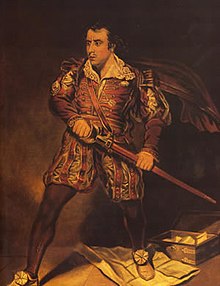 |
| Edmund Kean (4 November 1787 – 15 May 1833) |
Edmund Kean (4 November 1787 – 15 May 1833) was a celebrated British Shakespearean stage actor born in England, who performed in London, Belfast, New York, Quebec, and Paris among other places. He was well known for his short stature, tumultuous personal life, and controversial divorce.
Here's a bit about his rise as an actor:
For several years, his prospects were very gloomy, but in 1814, the committee of Drury Lane Theatre, which was on the verge of bankruptcy, resolved to give him a chance among the "experiments" they were making to win a return of popularity. When the expectation of his first appearance in London was close upon him, he was so feverish that he exclaimed, "If I succeed I shall go mad." Unable to afford medical treatment for some time, his elder son died the day after he signed the three-year Drury Lane contract.
His opening at Drury Lane on 26 January 1814 as Shylock roused the audience to almost uncontrollable enthusiasm. Contemporaries recognized that Kean had brought dignity and humanity to his portrayal of the character. Jane Austen refers to his popularity in a letter to her sister Cassandra dated 2 March 1814: "Places are secured at Drury Lane for Saturday, but so great is the rage for seeing Kean that only a third and fourth row could be got". Successive appearances in Richard III, Hamlet, Othello, Macbeth and King Lear demonstrated his mastery of the range of tragic emotion. His triumph was so great that he himself said on one occasion, "I could not feel the stage under me."
In 1817, a local playwright named Charles Bucke submitted his play The Italians, or; The Fatal Accusation to Drury Lane, for which Kean was to play the lead. The play was well received by both council and actors until Kean seemed to have a change of heart and began to make several offhand remarks that his part was not big enough for him. Then, after a performance where Kean went out of his way to botch the opening night of Switzerland by historical novelist Jane Porter in February 1819, for whom Kean had had a personal dislike, Bucke pulled the play out of contempt for Kean's conduct. After much cajoling to still perform the play by the theater staff, Mr. Bucke then later had it republished with a preface concerning the incident, including excerpts from correspondences between the involved parties, which was later challenged in two books, The Assailant Assailed and A Defense of Edmund Kean, Esq. The result was loss of face on both sides and the play being performed anyway on 3 April 1819 to a disastrous reception thanks to the controversy already surrounding the play and Kean's previous conduct.
On 29 November 1820, Kean appeared for the first time in New York City, as Richard III. The success of his visit to America was unequivocal, although he fell into a vexatious dispute with the press. In 1821, he appeared in Boston with Mary Ann Duff in The Distrest Mother, by Ambrose Philips, an adaptation of Racine's Andromaque. On 4 June 1821, he returned to England.
Kean was the first to restore the tragic ending to Shakespeare's King Lear, which had been replaced on stage since 1681 by Nahum Tate's happy ending adaptation The History of King Lear. Kean had previously acted Tate's Lear, but told his wife that the London audience "have no notion of what I can do till they see me over the dead body of Cordelia." Kean played the tragic Lear for a few performances. They were not well received, though one critic described his dying scene as "deeply affecting", and with regret, he reverted to Tate.
Read more on his Wikipedia Page

No comments:
Post a Comment
Hi Janeites! Thank you for visiting our website. We invite you to comment on our content. Of course, Lady Catherine would believe us all to behave like gentlemen and ladies, so please let us not disappoint her.
Also, please leave comments in English, as only Lady Catherine, had she ever studied a foreign language, would be a great profient enough to read such comments. (Merci! Arigato! Gracias!)